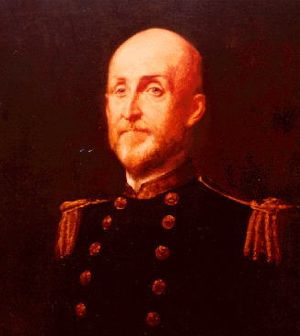

Naval History & Heritage Command photo NH 48056-KN.
RAdm. Alfred T. Mahan.
Commissioned as a lieutenant in 1861, Mahan served in Worcester, Congress, Pocahontas and James Adger, and as an instructor at the Naval Academy. He was promoted to lieutenant commander in 1865, to commander in 1872 and to captain in 1885. During the “Saltpeter War” between Chile and the defensive alliance of Bolivia and Peru, he commanded the sloop-of-war Wachusett, stationed at Callao, Peru to protect American interests.
In 1885, Rear Admiral Stephen B. Luce, founder and first President of the United States Naval War College, Newport, Rhode Island, appointed Captain Mahan to be its first instructor in naval history and tactics. For his first year on the faculty, Mahan remained at his home in New York City, researching and writing lectures. After completing this research period, he relieved Admiral Luce as president from 22 June 1886 to 12 January 1889 and served a second term from 22 July 1892 to 10 May 1893.
The lectures Mahan delivered in 1886 and 1887 postulated that sea power was the greatest historic requisite for national power and were published in 1990 as the The Influence of Sea Power upon History, 1660–1783. A second set of lectures was published in 1892 as The Influence of Sea Power upon the French Revolution and Empire, 1793–1805. Together, these books attracted international attention to the College.
In 1893, Captain Mahan was appointed to command the powerful new protected cruiser Chicago on a visit to Europe, where he was received and fêted. Thereafter, he returned to the War College as lecturer until 1912. He continued to write voluminously and received honorary degrees from Oxford, Cambridge, Harvard, Yale, Columbia, Dartmouth and McGill Universities. In 1902, he coined the term “Middle East” in an article “The Persian Gulf and International Relations,” published in the National Review. In 1906, he became rear admiral by an act of Congress promoting all retired captains who had served in the Civil War.
At the outbreak of World War I in 1914, Rear Admiral Mahan initially supported the cause of Great Britain, but an order of President Woodrow Wilson prohibited all active and retired officers from publishing comments on the war.
Admiral Mahan died of heart failure on 1 December 1914 at Quogue, Long Island, New York.